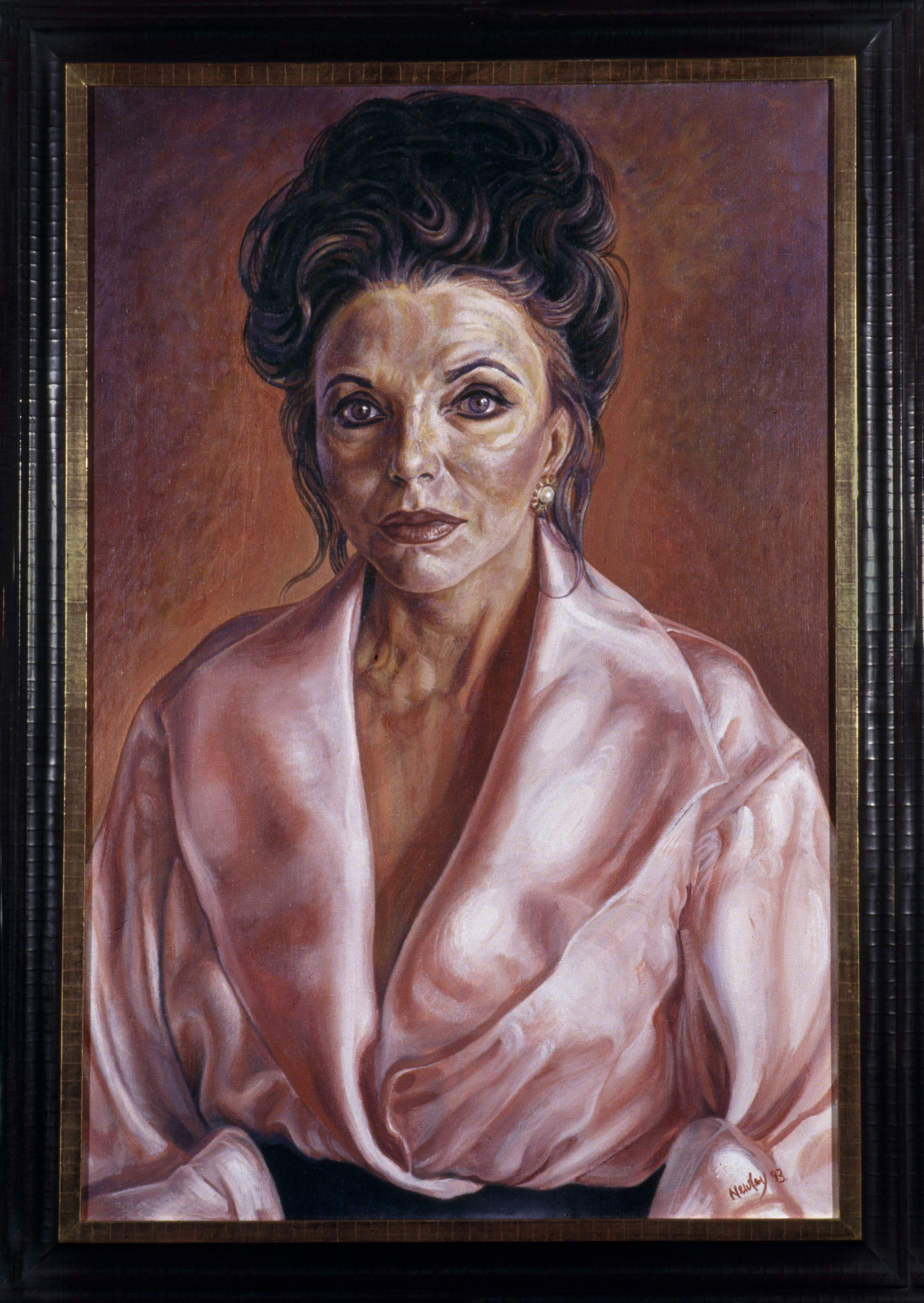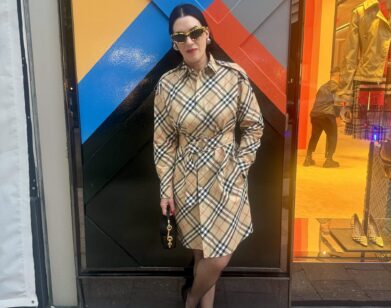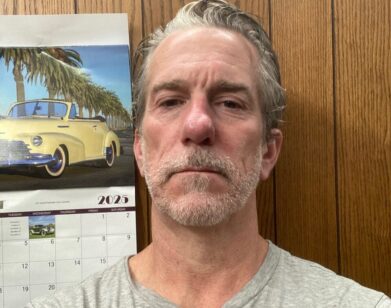Alexander Newley on what it was like to grow up as Joan Collins’s son
Alexander Newley—the British artist best known for his “portrait of a portrait” type paintings of some of the world’s most well-known faces across theatre land—has bravely confronted his singular biggest influence in a new memoir: a peripatetic, abandoned childhood as the only son of Hollywood movie star Joan Collins and Oscar-winning composer, stage genius and entertainer, Anthony Newley.
In Unaccompanied Minor, both the tag he wore on countless solo flights between London and LAX and the title of his emotionally penetrating tell-all, Newley deconstructs his childhood abyss, subservient to the whims, fantasies and ultimate emptiness of celebrity parents, themselves “enslaved” to the brutal studio system and an “ogre called show business.”
A three-dimensional story seen through the prism of the “present” childhood state, experiences are tied to addresses: 1106 Summit, “my Edenic beginning and the source of all my subsequent wanderlust,” and incidents: “the guy produced a large white box, tied with a ribbon, a little present from Evel Knieval.” Cleverly framed by 28 of his self portraits, Newley becomes an observer of the glossy, picture-perfect family he features in and yet doesn’t recognize.
From his North London studio, Newley says he stills see the book as a celebration of the drama of a unique early life and ponders what his late father would say.
DAVINA CATT: The prologue suggests writing your memoir was an unravelling and cathartic experience for you?
ALEXANDER NEWLEY: I’ve been into the material for a quite a while now so, in a way, the catharsis is ongoing because bringing the book out into the world is a big catharsis—the writing of it not so much because I was always in touch with the experiences—as an artist you stay in the detail. I think there are some artists that rely very much on their own story to find their way and navigate through their work, so my experiences now, when they have ripened, will also come into my work, I know that. I will never put my past completely behind me—it’s always going to be fueling what I do.
CATT: There’s this whole running theme throughout—the idea of make-believe. But from your point of view, you are a kid creating a make-believe world and living through that lens.
NEWLEY: Well I am a strong believer in make-believe and the importance of it. You have to be the hero of your own story in life because no one else will do it for you. And that applies to creativity—this is who I feel I really am, I am going to stay true to this, and I am going to take control and be the driver of my life—and there’s a movie make-believe in that. There’s a passion there. One should be passionate about ones own self and truth—if you can’t be passionate about that, it’s over.
CATT: You’ve been vocal about this idea that you felt surrounded by too much sexual proclivity at such a young age, that your father “thought innocence was an aphrodisiac.”
NEWLEY: I think the thing to remember is that the times—that context—the ’60s were so permissive and liberal.
CATT: Yes, but you go into detail about his X-rated film, Can Heironymus Merkin Ever Forget Mercy Humppe and Find True Happiness?, which feels like a tipping point in the book but also his life—since it led to the end of his marriage to your mother, who played Polyester. Do you feel you were absorbing and aware of his sexual nature as a child or is it retrospective in writing the book?
NEWLEY: A bit of both. My father was obviously incredibly creative. His sexuality was very powerful and I think that often goes together. And due to the very permissive time and that belief in the ’60s that to follow your bliss and passion was truth, and also the way into the truth, and sex and love was all part of that, he really went for that. The film Heironymus is a sort of sermon on the mount of sexual liberation. There’s a lot that is positive about that but I think it’s zany, madcap, a little crazy but it’s good crazy. It’s a very, very interesting film—I was in the film, I played myself at four years old—he shot the whole thing on the beach in Malta and it was just like a circus. He was very influenced by Fellini’s 8 1/2 but you see lots of other hugely inventive stuff, and an amazing, full on Broadway score.
CATT: There’s an affecting section when you are taken backstage at one of his Vegas performances.
NEWLEY: I was taken backstage by one of my father’s friends, who was a comic at the Thunderbird, which was one of those dancing girl palaces. He took me into the dressing room and said, “This is Tony Newley’s son,” and they all descended upon me! Those experiences for a kid … I know that’s why I wrote the book, I am always trying to pinch myself that these things actually happened to me.
CATT: That’s the thing that gives the lie to the people who think the book is a bit of a downer. It’s a celebration of this incredible childhood. The celebration of a drama of an early life, which was unique in what I saw. There’s such a deep connection between your life and your artwork. How would you say your upbringing has influenced your portrait style?
NEWLEY: The thing that Dad really opened up for me—he was fascinated by Eastern philosophy and mysticism, this went along with his self-examination—he really wanted to get to the bottom of why he was how he was, what made him tick. He was intellectually a seeker. He discovered a writer called Alan Watts, an ex-Anglican priest, who got very into Eastern philosophy in the ’50s. He went to San Francisco and was instrumental in starting the whole San Francisco renaissance, which actually led to the 60’s. So you could say Alan Watts was the founding father of the whole intellectual vermin underneath the hippie movement. Dad discovered his books in the early ’70s and shared them with me. So I came to portraiture through an interest in meditation, consciousness, the nature of consciousness—from my early teens. I have always been really interested in people, because people’s fundamental reality is a mystery to them. I think we need that in order to live because we are upwellings of consciousness, which is divine. That really interests me. So when I am doing a portrait, that is what I am digging. I have become obsessed with this one moment of my subject’s existence and I feel if I can adequately capture the power of that one moment, I have somehow captured this mystery. So that’s the fountainhead of my work.
CATT: The book is structured around the portraits, in which you place yourself looking back. Tell me about the idea of time past and memory and how that plays out.
NEWLEY: The particular picture “Self Portrait with a Happy Family,” which I talk about in the book because I found that still photo—it looked a lovely family but I didn’t remember being part of it. I started to think, how am I going to make the self portrait as a genre new and interesting? So I did self portrait with my childhood self as no one had done that.
CATT: What do you think your father would say now if he were to read your book?
NEWLEY: I’d like to think he would be very proud of me because he was very driven by the truth and always tried to find it in his work, so the fact I have tried to do that as well, I think he would applaud it.
UNACCOMPANIED MINOR: A MEMOIR BY ALEXANDER NEWLEY, PUBLISHED BY QUARTET BOOKS, IS AVAILABLE NOW ON AMAZON.







